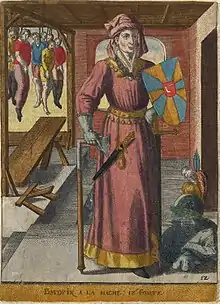Baldwin VII, Count of Flanders
Baldwin VII of Flanders (1093 – 17 July 1119) was Count of Flanders from 1111 to 1119.
| Baldwin VII | |
|---|---|
 | |
| Count of Flanders | |
| Reign | 1111 – 17 June 1119 |
| Predecessor | Robert II |
| Successor | Charles the Good |
| Died | 17 June 1119 |
| Spouse | Hawise of Brittany |
| Issue | none |
| House | House of Flanders |
| Father | Robert II of Flanders |
| Mother | Clementia of Burgundy |
Baldwin was the son of Count Robert II of Flanders and Clementia of Burgundy.[1][2] He succeeded his father as count when he died on 5 October 1111.[3]
Reign
Baldwin succeeded his father as count when he died on 5 October 1111.[3] He was under the influence of his powerful mother Clementia of Burgundy. He tried to assert independence from her, but she still remained influential behind the scenes.[1] Baldwin was an impetuous and impulsive young man, extremely hostile towards Henry I of England.[3][1] The inexperienced new count solicited the advice of his cousin, Charles the Good, who was several years older. It was Baldwin who arranged the marriage of Charles to the heiress of the County of Amiens, Margaret of Clermont, in 1118. Baldwin invaded Normandy in 1118 and raided many towns.[4]
In 1105, Baldwin married Hawise of Brittany (also called Havide), daughter of Duke Alan IV of Brittany. The groom was twelve and the bride nine. The union, in all probability, was never consummated. They were divorced in 1110. Baldwin did not remarry. Baldwin and Hawise had no known issue.
Death
He died after being wounded in 1118,[3][5] hit on the head by a lance[5] at the Battle of Bures-en-Bray, where he was fighting Henry I of England, on behalf of Louis VI of France.[6] When he was dying in 1119[6] at Eu,[3][7][5] Baldwin declared his cousin Charles his heir.[1][8][5] he died on 17 June 1119.[4] Charles became the new count of Flanders after his death.[2][1]
References
- Evergates, Theodore, ed. (3 August 2010). Aristocratic Women in Medieval France (EBook). University of Pennsylvania Press, Incorporated. p. 118. ISBN 9780812200614.
- Hans Hummer (3 May 2018). Visions of Kinship in Medieval Europe (EBook). OUP Oxford. ISBN 9780192518309.
- Harper-Bill, Christopher, ed. (1999). Anglo-Norman Studies XXI Proceedings of the Battle Conference 1998 (Hardcover). Boydell Press. p. 163. ISBN 9780851157450.
- Elisabeth van Houts (25 April 2013). M. C. Van Houts, Elisabeth; van Houts, Elisabeth; Love, Rosalind (eds.). The Warenne (Hyde) Chronicle (Hardcover). OUP Oxford. p. 9. ISBN 9780199665204.
- Jim Bradbury (27 February 2007). The Capetians: Kings of France 987-1328 (EBook). Bloomsbury Publishing. p. 139. ISBN 9780826435149.
- Sara McDougall. Royal Bastards The Birth of Illegitimacy, 800-1230 (Hardcover). Oxford University Press. p. 151. ISBN 9780198785828.
- Matthew Paris (15 November 2012). Madden, Frederic (ed.). Historia Anglorum Sive, Ut Vulgo Dicitur, Historia Minor Item Ejusdem Abbreviatio Chronicorum Angliae (Paperback). Cambridge University Press. p. 429. ISBN 9781108048675.
- Paul, Nicholas L. (21 September 2012). To Follow in Their Footsteps: The Crusades and Family Memory in the High Middle Ages. Cornell University Press. ISBN 978-0801465543.
- www.genealogie-mittelalter.de
- Bram Brutsaert: Boudewijn VII Hapkin, een Witte Ridder uit de 12de eeuw, graaf van Vlaanderen (1111–1119). Dissertation 2003–2004 in the University of Louvain, see online: Deel I. Prins Boudewijn (1093–1111)